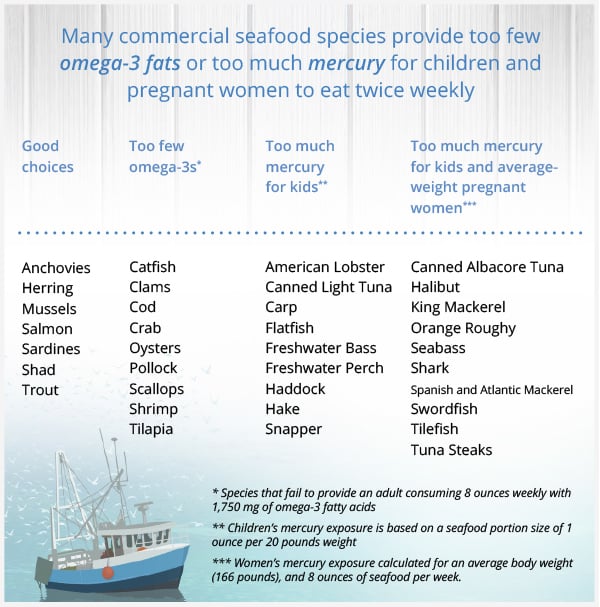The FDA has
worked with the EPA to come out with new guidelines that promote increased
seafood and fish consumption in pregnant and breastfeeding women. Over the
years, pregnant women have cut back on their seafood consumption due to fears
of the mercury levels in fish being harmful to the growing fetus. However, most
of the commonly eaten fish and shellfish are low in mercury and critical for
optimal neurological development of the fetus. Low mercury seafood includes
salmon, shrimp, light canned tuna, tilapia, catfish, pollock and cod. The FDA’s
key message is:
“Eat 8 to 12 ounces of a variety of fish
each week from choices that are lower in mercury. The nutritional value of fish is
important during growth and development before birth, in early infancy for breastfed infants, and
in childhood.” (1)
There has been extensive research
indicating that fish have incredible health benefits and people that eat fish
regularly tend to live longer and healthier lives. Fish and shellfish are
extremely lean sources of protein, rich in vitamins, minerals, and many contain
high levels of the omega-3 fatty acids EPA and DHA. Your body does not make EPA
and DHA on its own, as it must convert these from plant-based sources of
omega-3’s that you consume…but the conversion rate is low and typically
inadequate, and low in men. The omega-3 fatty acids are shown to be
anti-inflammatory and incredibly important for heart, brain, and eye health.
The goals of the new guidelines are to
promote that people eat low-mercury fish 2-3x per week (8-12 ounces total),
avoid the fish highest in mercury (tilefish from the Gulf of Mexico, shark,
swordfish, and king mackerel), limit white albacore tuna to 6 oz/wk, be aware
of fish advisories when harvesting your own fish, and stay within your calorie
needs when adding more fish to your diet. Most white fish filets are about 4
oz, whereas when you eat a meal out you can easily get a tuna or salmon filet
that runs you 6-8 oz.
The push for these new guidelines is
because many pregnant women (and people in general) have completely cut seafood
out of their diet. It seems that women were fearful since the FDA set
guidelines in 2004 limiting seafood consumption to 12 oz per week. Many women
were misinformed and instead of keeping their intake to the 12 oz per week,
they decided to cut it out altogether. High intakes of omega-3’s through
seafood and fish oil supplements shown to have a positive influence on
gestational age and birth weight, which are important determinants of infant
morbidity, mortality, neurological development, and risk for obesity later in
life (3). In addition to eating seafood while pregnant,
it is encouraged that people of all ages and life stages consume fish regularly
to obtain all the health benefits. For children, choose smaller portions
appropriate for their age and size.
Fish is usually the healthiest option
when eating out at a restaurant (assuming it isn’t breaded and fried), and is a
super quick protein to cook when you are running low on time. A fish filet
cooks much quicker (5-7 min) than chicken breast, and is a great staple to have
on hand in your freezer. I also encourage people to try some more exotic
seafood, like calamari,
and incorporate shellfish like oysters and mussels into your diet since they
are great sources of zinc (important for your immune system &
reproduction!) and iron. Don’t be afraid of the cholesterol in shellfish like
shrimp since shrimp are virtually fat free and have no saturated fat. In fact,
eating seafood, whole grains, and vegetables for dinner is a winning combo to
actually reduce your blood cholesterol levels. Below is a chart from the Environmental Worker's Group of good and not-so-good seafood choices:
References:
1. http://www.fda.gov/downloads/Food/FoodborneIllnessContaminants/Metals/UCM400358.pdf
2. http://www.ewg.org/research/us-gives-seafood-eaters-flawed-advice-on-mercury-contamination-healthy-omega-3s
3. http://www.hmhb.org/wp-content/uploads/2012/10/PNWG-White-Paper1.pdf
4. Hibbeln JR, Davis JM, Steer C, Emmett P, Rogers I, Williams C, Golding J. Maternal seafood consumption in pregnancy and neurodevelopmental outcomes in childhood (ALSPAC study): an observational cohort study. Lancet. 2007 Feb 17;369:578-85
5. http://healthland.time.com/2013/04/02/fish-the-fountain-of-youth/

1 comment:
Home Remedies : The Best Way To Get Rid Of Many Diseases Without Any Side Effects. These Natural Home Remedies Are Proved By Many Medical Institutes So That These are the best option because they are cheap and no have no side effects like pills or other treatment options.
Post a Comment